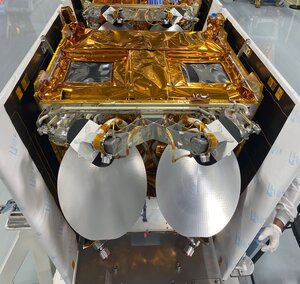Student Opportunity to take part in Arctic Mars Analog Svalbard Expedition (AMASE) 2007
Ever wondered what it would be like to spend two weeks in Svalbard, an archipelago in the Arctic Ocean? Ever dreamed of taking part in an expedition among an international crew of scientists and engineers? Well here is your chance to participate in the Arctic Mars Analog Svalbard Expedition 2007.
The Arctic Mars Analog Svalbard Expedition (AMASE) will take place from 12 to 26 August 2007 and is being led by Hans E.F. Amundsen from the Earth and Planetary Exploration Services (EPX), Oslo, in collaboration with Andrew Steele from the Carnegie Institution of Washington (CIW), and scientists and engineers from other NASA- and ESA-related institutions.
About AMASE

AMASE develops and tests payload instruments for future Mars missions on Mars analogue field sites in Svalbard, including instruments onboard both NASA’s MSL- and ESA’s ExoMars missions. Field sites include the Bockfjord Volcanic Complex (BVC) with a unique combination of volcanoes, hot springs and permafrost, which is the only place on Earth with carbonate deposits identical to carbonates in the Martian meteorite ALH84001.
BVC provides a unique opportunity to study the interaction between water, rocks and primitive life forms in a Mars-like environment and is an ideal testing ground for instruments under development for future "Search for Life" missions to Mars. Research topics centre on formation and weathering of carbonate deposits in various BVC localities including cryogenic carbonate deposits and blue ice vents in sub-glacial volcanoes and associated microbial activity, bio-geo interactions and organic chemistry.

AMASE 2004 performed the first ever field test of a suite of instruments capable of detecting a single microbial cell on Mars and AMASE 2005 performed on-site detection of frozen microbial communities in blue ice vents inside the Sverrefjell volcano. Equipment used in the field is adapted to function in the frigid Svalbard temperatures, and to detect and characterize low levels of microbiota, and organic and mineralogical biomarkers rapidly. These tools assist in the real-time understanding of the environment and permit the team to gather pertinent samples and test hypotheses with minimal sample disturbance. The sample acquisition and analysis methods are providing tests of protocols for experiments on future missions to Mars.
There is an opportunity for one student to participate in AMASE. The role of the winning student in the expedition will either be to propose and carry out her/his own experiment linked to this field of research or simply to observe and assist the other experimenters. The winner will also be expected to write a daily 'blog' or diary, in English, for the ESA website.
How to participate

To apply to participate in AMASE, please register by sending an email with an attached letter in MS Word format explaining why you want to take part to success@esa.int with 'Application' in the subject line. If you have any questions concerning your application please send them to the same address, indicating 'Question' in the subject line.
The attached letter in English should not exceed 800 words and should include the following:
- full contact details i.e. name, nationality, age, university and field of current study, year of study, tel/ fax
- your motivation for participating in AMASE
- an explanation of why your field of study is relevant to AMASE
- brief description of your experiment proposal, if applicable (not mandatory)
- your idea for the daily 'blog' please send us as a sample an invented blog entry for one day
The deadline for all registrations is 29 June 2007 and ESA will announce the winner by 13 July 2007.
CALL IS CLOSED
Note for applicants

Only applications from university students up to Masters level or equivalent, and from ESA Member States* will be accepted. The winner is expected to have a good command of English for writing the 'blog' entries and should be available for the entire duration of the expedition (12 – 26 August 2007 plus time for travelling to/from Svalbard. Travel cost are paid by ESA and the cost for participating in the expedition will be paid by the Norwegian Space Centre but the winner will be expected to organise her/his own travel and medical insurance cover.
The student selected will need to bring normal mountain hiking equipment e.g. boots, sweater, pants, backpack, the extra equipment needed for fieldwork on Svalbard e.g. down jacket, windproof pants/jacket will be provided by AMASE.
The ideal student should be capable of enjoying long days in the field – and long walks in rugged terrain. He/she will be put through an Arctic safety course including polar bear safety and rifle shooting.
*Austria, Belgium, Denmark, Finland, France, Germany, Greece, Italy, Ireland, Luxembourg, the Netherlands, Norway, Portugal, Spain, Sweden, Switzerland, United Kingdom.















 Germany
Germany
 Austria
Austria
 Belgium
Belgium
 Denmark
Denmark
 Spain
Spain
 Estonia
Estonia
 Finland
Finland
 France
France
 Greece
Greece
 Hungary
Hungary
 Ireland
Ireland
 Italy
Italy
 Luxembourg
Luxembourg
 Norway
Norway
 The Netherlands
The Netherlands
 Poland
Poland
 Portugal
Portugal
 Czechia
Czechia
 Romania
Romania
 United Kingdom
United Kingdom
 Slovenia
Slovenia
 Sweden
Sweden
 Switzerland
Switzerland


























